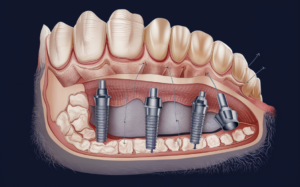Full arch dental implants are a revolutionary solution for people who have lost all or most of their teeth. This advanced dental procedure replaces an entire row of missing teeth with a fixed, permanent set of prosthetic teeth supported by dental implants. It offers a more stable and natural-looking alternative to traditional dentures, improving both function and appearance.
Key Takeaways:
- Full arch dental implants replace an entire row of missing teeth
- They provide a permanent, fixed solution unlike removable dentures
- The procedure typically uses 4-6 implants to support a full arch of teeth
- Full arch implants improve chewing, speaking, and overall quality of life
- The treatment is customized to each patient’s unique needs
- Recovery time is usually shorter compared to individual implant placement
- Maintenance is similar to caring for natural teeth
- Cost varies but is often seen as a long-term investment in oral health
Understanding Full Arch Dental Implants

Full arch dental implants are a game-changer in the world of restorative dentistry. They offer a permanent solution for those who have lost all their teeth in either the upper or lower jaw, or both. Unlike traditional dentures that sit on the gums, full arch implants are surgically placed into the jawbone, providing a stable foundation for a full set of replacement teeth.
How Full Arch Dental Implants Work
The concept behind full arch dental implants is straightforward. A series of titanium posts are surgically inserted into the jawbone. These posts act as artificial tooth roots. Once they’ve integrated with the bone, they provide a strong base for attaching a full arch of prosthetic teeth.
Typically, four to six implants are used to support an entire arch of teeth. This is why you might hear terms like “All-on-4” or “All-on-6” when discussing full arch implants. The number of implants used depends on factors such as bone density, jaw size, and the specific needs of the patient.
Benefits of Full Arch Dental Implants

Full arch dental implants offer numerous advantages over traditional dentures:
- Stability: They don’t slip or move when you eat or speak.
- Comfort: They feel more like natural teeth.
- Improved chewing ability: You can eat a wider variety of foods.
- Better speech: No worries about dentures affecting your pronunciation.
- Bone preservation: Implants stimulate the jawbone, preventing bone loss.
- Long-lasting: With proper care, they can last a lifetime.
- Improved confidence: They look and function like natural teeth.
The Full Arch Dental Implant Procedure
The process of getting full arch dental implants involves several steps and typically takes a few months from start to finish. Here’s a breakdown of what you can expect:
Initial Consultation and Planning
Your journey begins with a thorough examination and consultation. Your dentist will assess your oral health, take X-rays and 3D scans of your mouth, and discuss your goals and expectations. This information is used to create a customized treatment plan.
Preparatory Procedures
Some patients may need additional procedures before implant placement. This could include tooth extractions, bone grafting, or treatment for gum disease. These steps ensure your mouth is healthy and ready for implants.
Implant Surgery
On the day of surgery, you’ll receive local anesthesia to ensure you’re comfortable. The dentist will then place the implants into your jawbone. In some cases, temporary teeth may be attached the same day.
Healing and Osseointegration
After surgery, your jawbone needs time to heal and fuse with the implants. This process, called osseointegration, typically takes 3-6 months. During this time, you may wear temporary teeth.
Attaching the Permanent Teeth
Once your implants have fully integrated with your jawbone, your dentist will attach the permanent prosthetic teeth. These are custom-made to match the color, size, and shape of natural teeth, ensuring a beautiful and functional smile.
Recovery and Aftercare
Recovery from full arch dental implant surgery is generally quicker than you might expect. Most patients can return to work within a few days. However, it’s important to follow your dentist’s aftercare instructions carefully to ensure proper healing.
Immediate Post-Surgery Care
In the days following surgery, you may experience some swelling and discomfort. This is normal and can be managed with over-the-counter pain medication and cold compresses. Stick to soft foods and avoid hot liquids for the first few days.
Long-Term Care and Maintenance
Once your permanent teeth are in place, caring for full arch dental implants is similar to caring for natural teeth. Regular brushing, flossing, and dental check-ups are essential. While the implants themselves can’t decay, the surrounding gum tissue needs to be kept healthy to ensure the longevity of your new smile.
Candidacy for Full Arch Dental Implants
Not everyone is an ideal candidate for full arch dental implants. Good candidates typically:
- Have lost all or most of their teeth in one or both jaws
- Have adequate bone density to support implants
- Are in good overall health
- Don’t smoke or are willing to quit
- Have healthy gums or are willing to undergo treatment for gum disease
Alternatives to Full Arch Dental Implants
For those who aren’t suitable candidates for full arch implants, there are alternative options:
- Traditional dentures
- Implant-supported overdentures
- Partial dentures
- Dental bridges (for those missing only a few teeth)
Cost Considerations
The cost of full arch dental implants can be significant, but many patients find them to be a worthwhile investment in their long-term oral health and quality of life. Here’s a breakdown of factors that influence the cost:
| Factor | Impact on Cost |
|---|---|
| Number of implants | More implants generally increase cost |
| Need for preparatory procedures | Bone grafts or extractions add to overall cost |
| Materials used | Higher quality materials may cost more |
| Dentist’s experience | More experienced practitioners may charge higher fees |
| Geographic location | Costs can vary by region |
It’s important to note that while the initial cost may be higher than traditional dentures, full arch implants often prove more cost-effective in the long run due to their durability and low maintenance needs.
Insurance and Financing Options
Many dental insurance plans don’t fully cover implant procedures, but partial coverage may be available. Some options to manage the cost include:
- Dental savings plans
- Healthcare credit cards
- Payment plans offered by the dental office
- Health Savings Accounts (HSAs) or Flexible Spending Accounts (FSAs)
Choosing the Right Dentist
Selecting a skilled and experienced dentist is crucial for the success of your full arch dental implant procedure. Here are some factors to consider:
- Education and training in implant dentistry
- Years of experience performing full arch implant procedures
- Before-and-after photos of previous patients
- Patient reviews and testimonials
- Use of advanced technology and techniques
- Comfort level and communication style
Don’t hesitate to ask questions and seek second opinions before making your decision.
The Future of Full Arch Dental Implants
As dental technology continues to advance, we can expect to see improvements in full arch dental implant procedures. Some areas of ongoing research and development include:
- Improved implant materials for faster osseointegration
- Advanced 3D printing techniques for more precise prosthetic teeth
- Minimally invasive surgical techniques for faster recovery
- Stem cell therapies to enhance bone growth around implants
These advancements promise to make full arch dental implants an even more attractive option for tooth replacement in the future.
Conclusion
Full arch dental implants represent a significant advancement in restorative dentistry, offering a permanent, stable, and natural-looking solution for those who have lost all or most of their teeth. While the procedure requires a significant investment of time and money, the benefits in terms of improved quality of life, oral health, and self-confidence are substantial.
If you’re considering full arch dental implants, the first step is to consult with a qualified dentist who can assess your individual needs and determine if you’re a good candidate for the procedure. With proper care and maintenance, full arch dental implants can provide a lifetime of beautiful smiles and improved oral function.
